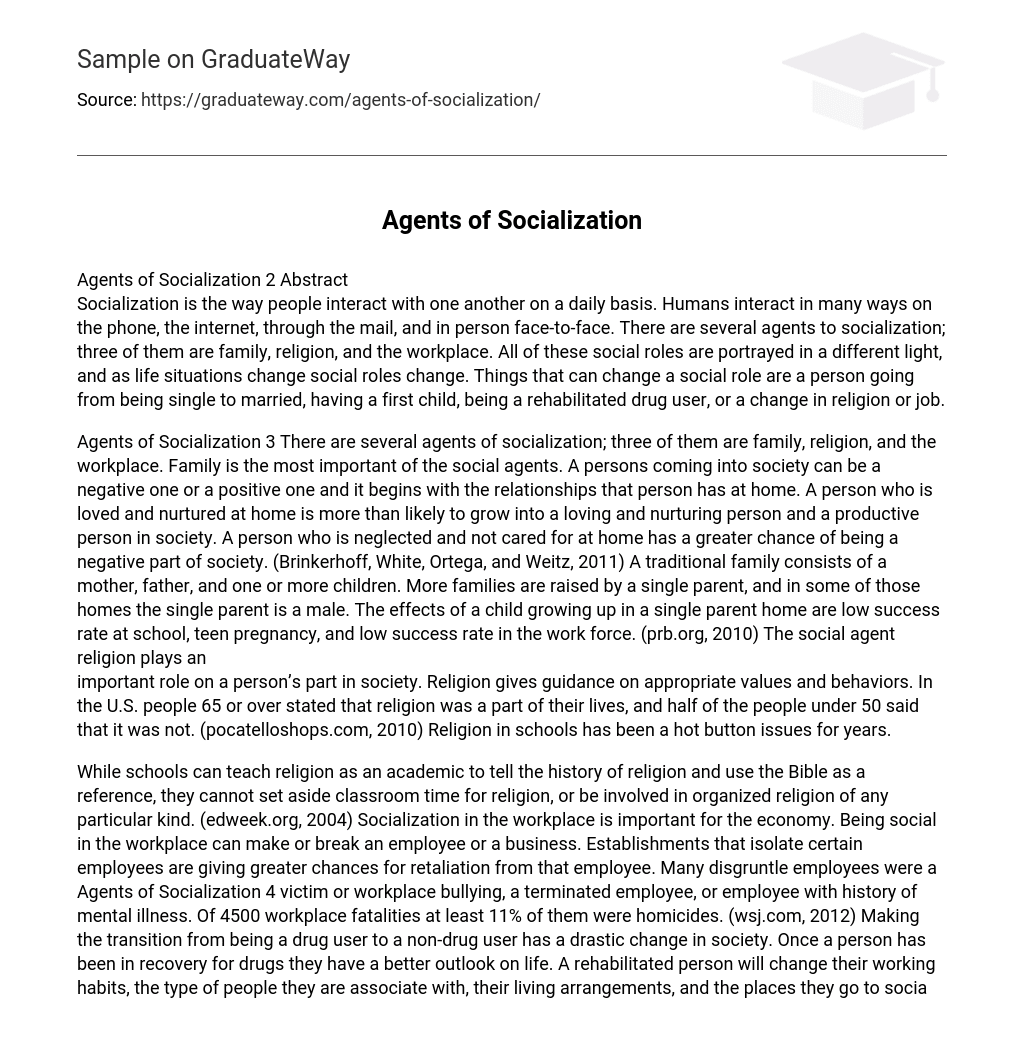Socialization involves individuals interacting with each other in various ways, including phone calls, internet communication, mail, and face-to-face meetings. Family, religion, and the workplace are important factors in socialization that demonstrate specific roles. As life situations change, social roles may also change. Events such as marriage, becoming a parent for the first time, overcoming drug addiction, or changing religious beliefs or jobs can all affect an individual’s social role.
The primary factors of socialization consist of family, religion, and the workplace. Family holds significant importance in shaping an individual’s social growth as their experiences and relationships within the family greatly influence their future. Those who receive love and support at home tend to become compassionate, nurturing, and productive members of society. Conversely, individuals who face neglect and a lack of care at home are more likely to turn into negative influences in society (Brinkerhoff, White, Ortega, and Weitz, 2011).
The prevalence of traditional families is decreasing as single-parent households become more common. It is important to note that in some cases, the single parent is male. The effects of growing up in a single-parent household can be observed in low academic achievement rates, high teenage pregnancy rates, and limited success in the workplace (source: prb.org, 2010). Religion plays a crucial role in society by offering guidance on values and behaviors. A survey conducted in the United States found that individuals aged 65 or older view religion as an integral part of their lives; however, half of those under 50 do not share this perspective (source: pocatelloshops.com, 2010). The inclusion of religion in schools has generated significant controversy over many years.
According to edweek.org (2004), schools are permitted to teach religion from an academic standpoint, utilizing the Bible as a historical reference. However, they are prohibited from dedicated class time for religious activities or endorsing any specific religious practices. In the workplace, socialization plays a vital role in fostering a strong economy. The ability to be social at work can greatly impact both employees and businesses, as establishments that isolate certain individuals run the risk of experiencing retaliation from those individuals.
Workplace bullying often targets individuals who are disgruntled, terminated, or have a history of mental illness. As reported by wsj.com, homicides make up at least 11% of the total workplace fatalities which amount to 4500 cases. Society is greatly affected by the transition from drug use to sobriety. When someone enters recovery for addiction, they experience significant positive transformations in their outlook on life. Rehabilitation impacts various aspects including work habits, social circle, living arrangements, and frequented places for socializing.
According to drugabuse.gov (2011), individuals who are under the influence of drugs tend to frequent areas where drugs are sold or used frequently. Their dependency on drugs prevents them from maintaining regular employment as they lack the motivation to work or are unable to stay away from drugs long enough to fulfill their work obligations. Moreover, individuals with an addiction often neglect their physical appearance and, if they have a home, prioritize drugs over the upkeep of their living space.
Reference
- Brinkerhoff, White, Ortega, and Weitz, 2011, Essentials of Sociology, Chapter 5, Pages 65-74 Mather, Mark, 2010, U.S. Children in Single Mother Families, Retrieved, http://www.prb.org/Publications/PolicyBriefs/singlemotherfamilies.aspx
- Evans, Joe, 2010, How Important is Religion in Today’s Society, Retrieved, http://www.pocatelloshops.com/new_blogs/community/?p=4397
- Religion In Schools, 2004, Retrieved, http://www.edweek.org/ew/issues/religion-in-schools/
- Kwoh, Leslie, 2012, Identify Disgruntle Employees Before They Retaliate, Retrieved, http://blogs.wsj.com/atwork/2012/08/24/identifying-disgruntled-employees-before-they-retaliate/
- National Institute on Drug Abuse, 2011, Drug Facts: Understanding Drug Abuse; Addiction, Retrieved, http://www.drugabuse.gov/publications/drugfacts/understanding-drug-abuse-addiction





